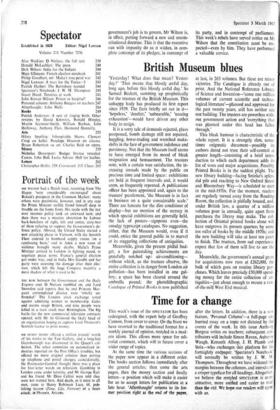British Museum blues
`Yesterday ! What does that mean? Yester- day?' That means that bloody awful day, long ago, before this bloody awful day.' So Samuel Beckett, summing up prophetically for the trustees of the British Museum. This unhappy body has produced its first report since 1939. The facts briefly set out in it— `hopeless: `derelict,' exhaustion'—would have driven any other body to resign.
It is a sorry tale of demands rejected, plans postponed, bomb damage still not repaired, haggling, horse-trading and wretched make- shifts in the face of government indolence and parsimony. Not that the Museum itself seems to have emerged from its mood of bleak resignation and bemusement. The trustees note, with a certain wan satisfaction, the in- creasing inroads made by the public on precious time and limited space: exhibitions are held at frequent intervals and, it would seem, as frequently repented. A publications officer has been appointed and, again to the trustees' puzzlement, 'the Museum is in fact in business on a quite considerable scale.' There are laments for the dire conditions-of display—but no mention of the secrecy in which special exhibitions are generally held, the lack of posters—signposts even—the smudgy typescript catalogues. No suggestion, either, that the Museum would, even if it could, entice the general public in to marvel at its staggering collections of antiquities.
Meanwhile, given the present pitiful bud- get, a few painstaking achievements are gratefully notched up: air-conditioning— without which, as the trustees observe, the entire collection is in danger from London air pollution—has been installed in one gal- lery; a space has been cleared around the umbrella pound; the photolithographic Catalogue of Printed Books is now published at last, in 263 volumes. But these are minor victories. The Catalogue is already out of print. And the National Reference Library of Science and Invention—'some one million volumes of current scientific and techno- logical literature'—planned and approved for the past twenty years, still has neither site nor building. The trustees are powerless with- out government action and 'everything that was planned under this head has fallen t hro ugh.'
This bleak humour is characteristic of the whole report. It is a strangely slim, some- times enigmatic document—possibly its authors dared not trust their self-control at greater length—consisting of a brief intro- duction to which each department adds its list of woes and major acquisitions. Possibly Printed Books is in the saddest plight. The new library building—facing Smirke's splen- did pile and reaching to New Oxford Street and Bloomsbury Way—is scheduled to start in the mid-1970s. For the moment, readers are regularly turned away from the Reading Room, the collection is pitifully housed, and, under British law, a quarter of a million volumes pour in annually, quite apart from purchases the library may make. The col- lection of Oriental printed books alone will have outgrown its present quarters by some ten miles of books by the middle 1970s; and the new building will take at least ten years to finish. The trustees, from sad experience, expect that few of them will live to see the day.
Meanwhile, the government's annual grant for acquisitions now runs at £262,000. the bulk of which goes on routine library pur- chases. Which leaves precisely £50,000 spend- ing money for the entire collection of an- tiquities—just about enough to mount a run- of-the-mill West End musical.


































 Previous page
Previous page